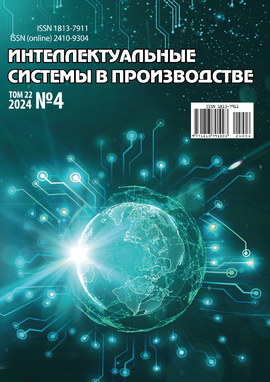Тематическое моделирование текстового документа с использованием матрицы терминов обработанного документа
DOI:
https://doi.org/10.22213/2410-9304-2024-4-24-31Ключевые слова:
лемматизация, токенизация, тематическое моделирование, текст, анализ, темаАннотация
Тематическое моделирование - это метод определения темы текстового документа путем анализа семантики и синтаксиса текста. При анализе текста метод определяет внутреннюю структуру документа или набора документов и использует эту информацию для классификации или группировки похожих слов по темам. Это также помогает выявить основные тенденции интересов в текстовом документе. Например, многие люди интересуются онлайн-покупками, политикой, спортом, экономикой, обществом и т. д. Существуют различные онлайн- и офлайн-методы интеллектуального анализа данных и алгоритмы, используемые для определения темы текста. Большинство из них используют определенный механизм, основанный на семантических характеристиках языка и тематике текста. В данном исследовании основная идея заключается в разработке методологии, которую можно эффективно использовать для тематического моделирования текста на разных языках. Модель сначала предварительно обрабатывает текст, который включает в себя токенизацию слов, удаление из него стоп-слова (STOPWORDS), выполнение лемматизации. Предварительная обработка текста и фильтрация несоответствующих элементов уменьшает размер текста и повышает производительность его классификации. Алгоритм предполагает наличие ‘n’ тем в текстовом документе и, основываясь на этом предположении, генерирует матрицы терминов обработанного документа (PDTM) для текстового документа. Матрица терминов обработанного документа (PDTM) представляет собой двумерную матрицу, которая присваивает конкретное числовое значение каждому слову в тексте на основе частоты его появления в документе, а затем соотносит это слово с каждой темой, предполагавшейся ранее. Матрица терминов обработанного документа (PDTM) генерируется для хранения токенизированных слов. Предлагаемая модель и ее результаты подробно описаны в разделах методологии и обсуждения этой статьи.Библиографические ссылки
Qiang J., Qian Z., Li Y., Yuan Y., Wu X. Short Text Topic Modeling Techniques, Applications, and Performance: A Survey // Journal of latex class files, Published in IEEE Transactions on Knowledge and Data Engineering, 2019, 34(1), pp.1427-1445. DOI:10.1109/ tkde.2020.2992485.
Abbasi M.M., Beltiukov A.P. Summarizing emotions from text using Plutchik wheel of emotion // Proc. of the 7thAll Russian Conference on Information technology for intelligent decision making support (ITIDS), Ufa, Russian Federation, 2019, 7 (166), pp. 291-294. DOI: 10.2991/itids-19.2019.52.
Abbasi M. M., Beltiukov A. P., Hussain L., Abbasi A. Q. Analysis of emotions from texts for managing society // Infocommunication technologies Journal, Academy of Telecommunications and Informatics, 2019, 2 (17), pp.246-254.
Abbasi M. M., Beltiukov A. P. Identifying the strength of emotions in relation with the topic of text using Word space // Proc. of the 21thinternational workshop on computer science and information technologies, Austria, Vienna // Journal of Atlantis Highlights in Computer Sciences, 2019, 3 (1), pp. 1-5. DOI: 10.2991/csit-19.2019.1.
Beltiukov A. P., Abbasi M. M. Logical analysis of Emotions in Text from Natural language // Vestnik Udmurtskogo Universiteta. Matematika. Mekhanika. Komp'yuternye Nauki, Ижевск. 2019. 1 (29). Pp. 106-116. URL: https://doi.org/10.20537/vm190110.
Shi T., Kang K., Choo J., ReddyC. K. Short-text topic modeling via non-negative matrix factorization enriched with local word-context correlations // Proc. oftheWorld Wide Web Conferences Steering Committee, 2018, pp. 1105-1114. DOI: 10.1145/3178876.3186009.
Abbasi M. M., Beltiukov A. P. Analyzing emotions from text corpus using word space CSIT`2018 // Proc. of the 20thInternational Workshop on Computer Science and Information Technologies ,Varna- Bulgaria, pp. 90-94, Industry 4.0, 2018, 3 (4), pp. 161-164. URL: https://stumejournals.com/journals/i4/2018/4/161.
Yin D., Chao Z., Liu W., Zhang X., Yu J. Wang. Model-based clustering of short text streams // Proc. of the 22ndACM SIGKDD International Conference on Knowledge Discovery and Data Mining, ACM, 2018, pp. 2634-2642. Doi: 10.1145/3219819.3220094.
Wang S., Roller S.,Erk K. Distributional model on a diet: One-shot word learning from text only. CoRR. 2017. URL: https://arxiv.org/abs/1704.04550v4.
Qiang J.,Chen P.,Ding W.,Wang T.,Xie F.,Wu X. Topic discovery from heterogeneous texts //In: Tools with Arti cial Intelligence (ICTAI), IEEE 28thInternational Conference on IEEE. 2016. Pp. 196-203. Doi: 10.1109/ICTAI.2016.0039.
Blei D.M. Probabilistic topic models // Communications of the ACM. 2012. 55 (4). Pp.77-84. Doi.org/10.1145/2133806.2133826.
Blei D.M., Griths T., Jordan M. The nested Chinese restaurant process and Bayesian nonparametric inference of topic hierarchies // ACM. 2010. 57 (2). Pp. 1-30. URL: https://cocosci.princeton.edu/tom/papers/ncrp.pdf.
Chang J., Boyd-Graber J., Gerrish S., Wang C., Blei D. M. Reading tea leaves: How humans interpret topic models // Proc.of 23rd Annual Conference on Neural Information Processing Systems // Advances in Neural Information Processing Systems. 2009. 32 (1). Pp. 288-296.
Yao L., Mimno D., McCallum A. Ecient methods for topic model inference on streaming document collections // Proc. of the 15thACM SIGKDD International Conference on Knowledge discovery and data mining. 2009. Pp. 937-946. URL: https://doi.org/10.1145/1557019.1557121.
Asuncion A.,Welling M., Smyth P., The Y.W. On smoothing and inference for topics models // Proc. of the 25th Conference on Uncertainty in Artificial Intelligence, June, 2009, pp. 27-34. URL: https://dl.acm.org/doi/10.5555/1795114.1795118.
Wei X., Croft B. LDA-based document models for ad-hoc retrieval // Proc. of the 29th Annual International ACM SIGIR Conference on Research and Development in Information Retrieval, Seattle, Washington, USA. 2006. DOI:10.1145/1148170.1148204.
Wallach H. Topic modeling: beyond bag-ofwords // Proc. ofTwenty-Third International Conference ICML, Pittsburgh, Pennsylvania, USA, 2006, June 25-29, 2006. DOI:10.1145/1143844.1143967.
Griths T., Steyvers M., Blei D.,Tenenbaum J.Integrating topics and syntax // Proc. of Neural Information Processing Systems.Vancouver, British Columbia, Canada. 2004. URL: https://papers.nips.cc/paper_files/paper/2004/hash/ef0917ea498b1665ad6c701057155abe-Abstract.html.
Blei D., Ng. A., Jordan M. Latent Dirichlet Allocation // Journal of Machine Learning Research. 2003. 3 (4), pp. 993-1022. URL: https://dl.acm.org/doi/10.5555/944919.944937.
LiuD.C.,Nocedal J. On the limited memory bfgs method for large scale optimization // Mathematical programming. 1989. 45 (1), pp. 503-528. URL: https://doi.org/10.1007/BF01589116.
Carey S., Bartlett E. Acquiring a single new word // Papers and Reports on Child Language Development. 1978. 15 (1), pp. 17-29. URL: https://api.semanticscholar.org/CorpusID:50145091.
Загрузки
Опубликован
Как цитировать
Выпуск
Раздел
Лицензия
Copyright (c) 2024 Мохсин Маншад Аббаси, Анатолий Петрович Бельтюков

Это произведение доступно по лицензии Creative Commons «Attribution» («Атрибуция») 4.0 Всемирная.


